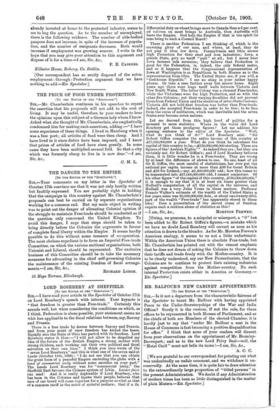LORD ROSEBERY AT SHEFFIELD.
[TO THE EDITOR OF TEE " SPECTATOR.")
Slit,—I have read your article in the Spectator of October 17th on Lord Rosebery's speech with interest. Your keynote is "that freedom is greater than Free-trade." Certainly this sounds well, but when considering the conditions on which, as I think, Federation is alone possible, your statement seems no whit less applicable to the fiscal relations between, say, Saxony and Prussia.
There is a free trade by decree between Saxony and Prussia, and from your point of view freedom has kicked the beam. Equally also the State of Ohio has parted with its freedom. Lord Rosebery states it thus :—" I will not allow to be dispelled my idea of the future of the British Empire, a strong mother with strong Children, each working out their own political and fiscal salvation on their own Lines." I think you once wrote of the "seven Lord B,oseberys," and this is what one of the seven said at Leeds (October 11th, 1888) : "1 do not see that you can obtain the great boon of a peaceful Empire encircling the globe with a bond of commercial unity • without some !sacrifice on your part." The Leeds Lord Rosebery was for "commercial unity," the Sheffield,Earl favours the Chinese system of Likin. Laisser faire run nisi! And it is really deplorable if Lord Rosebery, who has been in the Colonies and knows their people, believes that men of our breed will come together for a purpose so vital as that of a common tariff in the spirit of spiteful pedlars ; that if a 2s.
differential duty on wheat brings more to Canada than a 5 per cent. ad valorem on meat brings to Australia, then Australia will leave the Empire. God help the Empire if that is the spirit its sons bring to such a Council Board !
There is another Federation I am thinking. of, which is the crowning glory of our race, and where, at least, . they do not play it thus low down. Pennsylvania and Ohio secure high Protection for their steel and iron industries ; Iowa, a prairie State, gets no tariff " pull " at all ; but I never hear Iowa farmers talk secession ; they believe that Protection is good for the Federation, is, indeed, the only federal nexus, and so it happens that the Congressional representation of Iowa at Washington is as Republican in both Houses as is the representation from Ohio. The United States are, if you will, a "tied-house Republic." I see no sting in your rather happy phrase. Or take a case farther away but nearer home. Eight years ago there were huge tariff walls between Victoria and New South Wales. The latter Colony was a clamant Free-trader, while the Victorians were for high Protection, and so with the other five Colonies yet their varying fiscalities did not prevent them from Federal Union and the abolition of inter-State Customs. Victoria did not hold that freedom was better than Free-trade. Indeed, she accepted Free-trade in order to be free ; to be free from the curse of militarism, which was inevitable had the seven States ever become seven nations.
Let me descend from this high level of politics for a moment to mere statistics. Where , in the world did Lord Rosebery get those prodigous figures ? Let me address his opening sentence to the editor of the Spectator. "Well, what do you think of it ? " Lord Rosebery said: "Sir Robert Giffen computes the entire income of this country at .217,050,000,000 a year. What do you think he calculates the capital of this country to be,—.2150,000,000,000 sterling. These are figures of the 'Arabian Nights.' " As indeed they are ; but they are certainly not Sir Robert Giffen's ; and if Lord Rosebery believes them' it is little wonder he is a Free-trader. They are wrong by at least the difference of eleven to one. No one, least of all Sir R. Giffen, the most careful of statisticians, has ever put the national per capita income at more than ..f.39 for Great Britain and 416 for Ireland,—say,.21,400,000,000 odd ; how this comes to be transmuted into £17,000,000,000 odd, I cannot conjecture. Of
his other figure "of the capital of this country, X150,000,000,000," it is enough to say that it is at least six times greater than blulhall's computation of all the capital in the universe, and Alnlhall was a very Jules Verne in these matters. Professor Francis Walker's estimate of the wealth of the United States a
few years since was 30,000,000,000 dols., or about one-twenty-fifth part of the wealth "Free-trade" has apparently stored in these isles ! Does a presentation of the sacred cause of freedom require such a reckless abuse of statistics as this ?
[Owing, we presume, to a misprint or misreport, a "0" has been added to Sir Robert Giffen's figures,—a mistake which we have no doubt Lord Rosebery will correct as soon as his attention is drawn to the blunder. As for Mr. Moreton Frewen's American analogy, it seems to us not a little unfortunate. Within the American Union there is absolute Free-trade, but Mr. Chamberlain has pointed out with the utmost emphasis that he does not dream of asking the Colonies to throw down their tariffs and trade freely with the Mother-country., It is to be clearly understood, say our New Protectionists, that the Colonies are to continue to protect their existing industries against competition from the Mother-country. No such internal Protection exists either in America or Germany.— ED. Spectator.]






















































 Previous page
Previous page